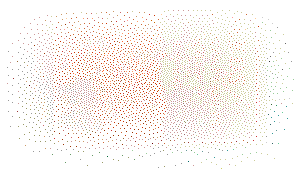Faber Futures

Project Coelicolor
If a microbe produces a pigment,
how do we work with it to dye textiles?
This seemingly simple question, explored over time, reveals a complex web of interdependence between human and non-human life, and across multiple scales and time horizons.
We began working with a wild strain of the soil-dwelling organism Streptomyces coelicolor to see whether its naturally secreted pigment compound could be used to dye textiles. In collaboration with Professor John Ward and his synthetic biology lab at University College London’s Department of Biochemical Engineering, we discovered that unique interactions between S. coelicolor and protein fibers could yield a colourfast finish without the use of chemicals – and with significantly reduced water usage compared to current industrial dyeing methods.
In the years since, Faber Futures has developed design-driven protocols engineered to achieve specific aesthetic and performance-related material outcomes – delivering products that possess embedded value in themselves and demonstrate the viability of new methods and technologies on the wider industrial scale. Our research explores the parametrics of biodesign and the resultant aesthetic narratives originating from interspecies collaboration. In this way, the bacteria becomes the co-author in the creation of a new textile design. The designer no longer specifies all the details of the final product, but rather brings together the conditions in which the living process can thrive and create.
Our process has drawn upon an interdisciplinary spectrum of knowledge and making practice, incorporating thinking and methodology from design, craft, engineering, and science. This new taxonomy of making has been enabled by the global cultural shift towards blurring disciplinary boundaries, driven by the possibilities of new technologies and the increasing cultural, economic, and industrial necessity of a sustainable model of production and consumption.

Project Coelicolor, Rise and Fall of a Micropolis, Bacteria dyed silk textile, 2017. Image Credit: Faber Futures
Fundamentally, Project Coelicolor offers a way of thinking, knowing, and making with life where design focuses on transforming systems rather than making stuff. By telling new material stories that are centered on equity, caretaking, and flourishing, we can start to create transformative systems that embody alternative potentials for scaling innovation and doing business for the futures we now need.

Natsai Audrey Chieza, Faber Futures Founder & CEO, 2018. Image Credit: Toby Coulson
At the crossroads of design and biotechnology, Faber Futures is a design agency at the intersection of nature, technology and society, designing with living systems to build sustainable futures.
Working across diverse sectors and disciplines, Faber Futures brings critical design thinking to life science technologies like synthetic biology, exploring and enabling compelling and preferable biodesign futures. Through its global network of biotech labs and collaborators, Faber Futures draws on the biofabrication possibilities presented by organisms such as bacteria, fungi and algae to develop new materials, processes and applications across a spectrum of industries- from textile design to the energy sector.
By mimicking, co-creating with and engineering living systems, Faber Futures works to generate effective, scalable frameworks to the ever-more pressing challenges of resource scarcity, climate change and sustainability.
Natsai Audrey Chieza is founder and CEO at Faber Futures. She is a leading thinker on the transformative role design can play in the equitable development of consumer biotechnology. With over ten years of experience co-developing multi-sector innovation strategies and shaping policy with global institutions, she leads a dynamic team that translates value and transforms systems across education, design, life science and manufacturing industries.
Over a decade of experimentation, Chieza established novel design-driven processes and for bacteria textile colouration, which have been exhibited internationally, including at Ars Electronica, Design Museum,Pompidou Centre, Vitra Design Museum and the Science Gallery Dublin. Chieza is a member of the current session of the World Economic Forum’s Global Futures Council on Synthetic Biology, contributing to the industry’s roadmap for a world changed by COVID-19. A TED speaker, Chieza has given talks on transdisciplinary innovation, including at Design Indaba, SxSW, BoF, and Dezeen Day, and has taught on biodesign programmes at Central Saint Martins in London and the Bartlett School of Architecture. She was awarded the INDEX award in 2019 and is named on ICON Design 100 2019, Evening Standard Progress 1000 2019, It’s Nice That Ones to Watch 2019, and OkayAfrica’s 100 Women 2018.

